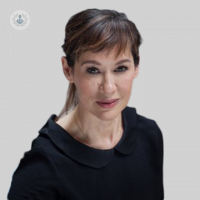Uveitis cataracts: how common are they?
Autore:Cataracts are one of the most common complications in patients with chronic uveitis (eye inflammation). The cataracts are usually caused by prolonged use of high-dose steroids that are needed to treat the condition rather than the inflammation per se. However, it is important for uveitis patients to manage their condition and use the steroid as directed as leaving it untreated can also lead to serious vision problems.
We’ve asked expert ophthalmologist Ms Theresa Richardson to explain why patients should not worry about developing cataracts following uveitis treatment and just how likely it is for cataracts to occur.

How can uveitis lead to cataracts?
Uveitis leads to cataracts usually because of the use of steroids that are required for the inflammation, be that by drops, tablets or the injections into the eye. However, patients shouldn't worry about this as cataract surgery by doctors trained in this field can be cured. It’s best to go to a surgeon that is experienced in treating cataracts with uveitis as you may need either oral or topical steroids prior to the operation to prevent complications.
In addition, cataract surgery in patients with uveitis can be trickier due to the iris (the coloured part of the eye) sticking to the lens, for the surgeon should, therefore, have experience in using devices to enlarge the iris of which there are many.
It’s important for uveitis patients not to worry about cataract development as under-treating iritis is not a good idea and can lead to serious visual problems.
How common are cataracts among patients with uveitis?
Not all patients with uveitis will get cataracts. It depends on how often you have to use the steroids and it’s not dependant on age either. Some children with juvenile iritis associated with arthritis can get cataracts.
How does having uveitis complicate cataract treatment? How does having cataracts complicate uveitis treatment?
If you have chronic anterior uveitis and have to use steroid drops a lot you may be more prone to cataracts, but those who have posterior uveitis affecting the back of the eye may be less prone unless they are given intravitreal steroids. That is injections into the ball of the eye not under the eye.
If someone has chronic uveitis, will they get further cataracts in the future?
Yes, they may do eventually it depends how many times they get the attacks and how long they last for. In addition, some patients with uveitis also develop high pressures in the eyes and this is why it’s good to go to someone who is used to dealing with both glaucoma and uveitis. However, cataracts are more common in such patients.
A word about special lenses and uveitis
It is very common now that patients want to have multifocal or varifocal lenses when they have cataract surgery. In people with uveitis, this option could be contraindicated as they could have retinal problems but not always so it’s best to talk to your surgeon on a one-to-one basis. It doesn’t rule it out completely but they special lenses should be used with caution.
Book an appointment with Ms Richardson now about an eye examination.


